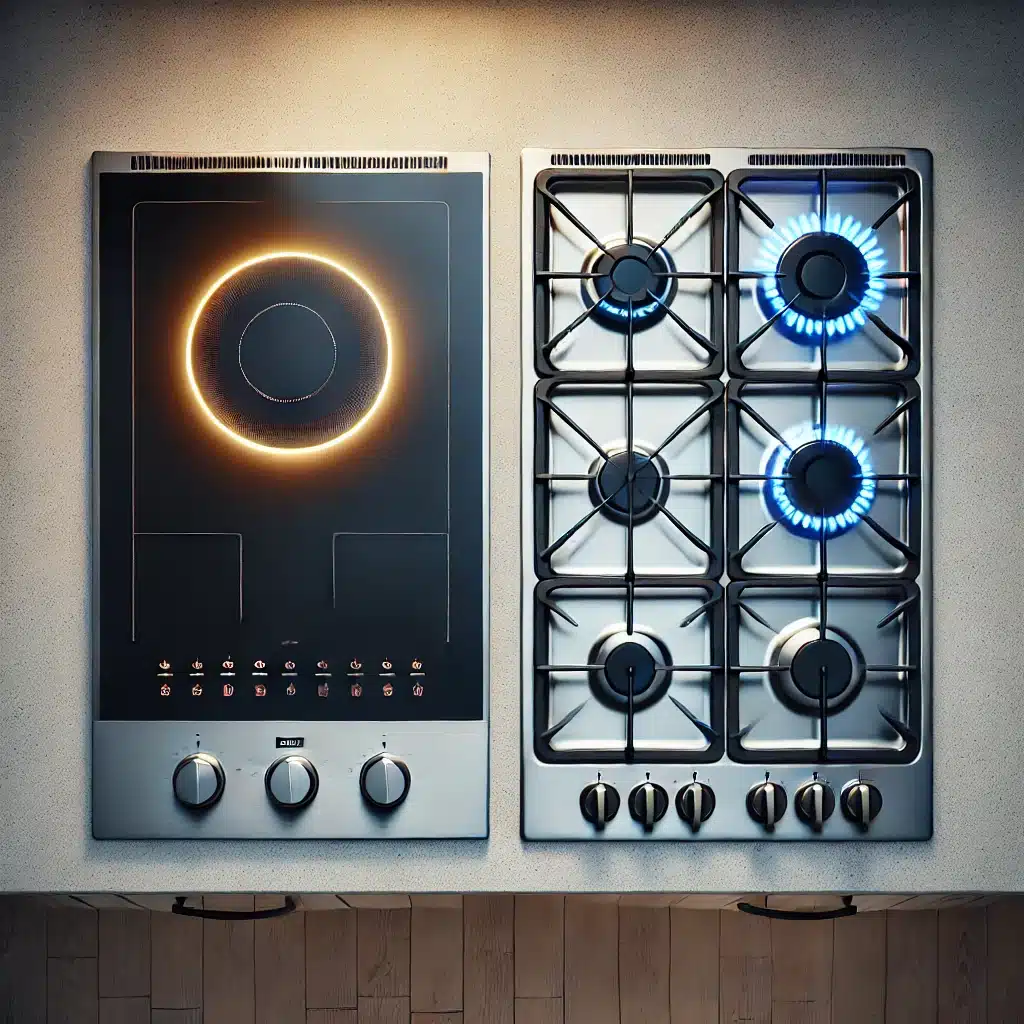Gas Stove vs. Electric Stove: Quick Verdict 👨⚖️
Trying to decide which stove is better for your kitchen? Here’s the fast answer.
Choose a gas stove if you value:
Instant flame control for hands-on cooking
Lower upfront appliance costs
Familiar, traditional cooking experience
Choose an electric (or induction) stove if you want:
Better energy efficiency and lower long-term costs
Improved indoor air quality (no gas emissions)
Safer cooking with no open flame
Up to $840 in IRA rebates for qualifying upgrades
Bottom line: Gas still wins for flame precision, but electric stoves lead in efficiency, safety, health, and future-proof savings.
Choosing between a gas or electric stove may feel like deciding between pancakes or waffles—it comes down to personal preference, but there are some key differences that could sway you.
The gas vs. electric stove debate has been heating up in recent years, fueled by advancements in energy-efficient stoves, environmental concerns, and even changes in homebuyer preferences. Let’s untangle the knot and help you decide which stove is right for your home and lifestyle.
Stove Performance: Precision or Consistency?
When it comes to cooking, performance is king. Gas stoves are often praised for their precision. The instant flame gives cooks direct control over heat levels, making them ideal for tasks like simmering delicate sauces or searing steaks.
On the other hand, electric stoves offer consistent, even heating. Modern electric stoves, especially those with glass tops or induction technology, excel at maintaining steady temperatures, which is a boon for baking or cooking long recipes.
Winner: It depends. Gas edges out electric stoves for precise heat control, but electric stoves take the cake for consistent, even heat.
Energy-Efficient Stoves: Electric Takes the Lead
When comparing energy efficiency, electric stoves tend to be the greener choice—especially when paired with renewable energy sources. Energy-efficient electric stoves, like induction models, transfer heat directly to cookware, reducing energy waste. In contrast, gas stoves lose a significant amount of heat to the surrounding air, making them less efficient overall.
Why are people switching from gas to electric stoves? Environmental concerns play a big role. Gas stoves emit methane, a potent greenhouse gas, even when turned off. Electric stoves, especially Energy Star-rated ones, contribute less to carbon emissions.
Winner: Electric stoves take the lead here for their energy efficiency and eco-friendliness.
Cost Comparison: Upfront vs. Long-Term Savings
Gas stoves typically cost less upfront, with prices ranging from $500 to $1,000 for standard models. Electric stoves, particularly induction models, can cost anywhere from $700 to $2,500.
However, when you factor in maintenance and utility costs, the story shifts. Electric stoves are often cheaper to operate over time, especially in areas with high natural gas prices or when paired with energy-efficient cookware.
Don’t forget the electric stove rebate! Under the Inflation Reduction Act, homeowners may qualify for up to $840 in rebates to replace a gas stove with an energy-efficient electric model, significantly offsetting the cost of upgrading.
Winner: Short-term? Gas stoves. Long-term? Electric stoves, especially when you factor in rebates.
Home Safety: Electric Stoves Are Gaining Favor
Safety is another critical consideration. Gas stoves come with inherent risks like gas leaks, open flames, and increased indoor air pollution. While these risks can be mitigated with proper ventilation and regular maintenance, they’re still worth noting.
Electric stoves, particularly induction models, eliminate these concerns. Induction stoves only heat the cookware, leaving the surrounding surface cool to the touch—making them an excellent choice for households with kids or pets.
Winner: Electric stoves, thanks to their reduced risks and advanced safety features.
Do Homebuyers Prefer Gas or Electric Stoves?
The answer depends on location and lifestyle. In urban areas or regions with higher electricity costs, homebuyers often lean toward gas stoves for their perceived superiority in cooking performance.
However, the tide is shifting. As more people prioritize energy efficiency and environmental sustainability, electric stoves are becoming increasingly desirable.
Winner: It’s a tie, depending on the buyer’s priorities.
Why Are People Switching to Electric Stoves?
Aside from environmental concerns, electric stoves have several modern advantages:
- Better Indoor Air Quality: Gas stoves release nitrogen dioxide and methane, which can affect respiratory health.
- Ease of Cleaning: Smooth glass tops are easier to clean than gas burners and grates.
- Rebates and Incentives: Financial perks like the stove tax credit make switching more affordable.
Real-Life Insights: The Benefits of Switching to an Electric Stove
Research highlights the tangible benefits of switching from gas to electric stoves. A study from Columbia University revealed that transitioning to an induction stove can reduce indoor nitrogen dioxide air pollution by over 50%, significantly improving indoor air quality.
Additionally, an analysis by Silicon Valley Clean Energy found that homeowners could save an average of $380 annually on energy bills when replacing gas appliances with electric ones.
These findings demonstrate that switching to an electric stove not only enhances the air you breathe but also offers meaningful financial savings—proof that making the change can benefit both your home and the environment.
In the Hot Seat: Frequently Asked Questions About Stoves
Is it hard to switch from a gas to an electric stove?
Switching requires some upfront work, including installing a dedicated 220-volt outlet and potentially upgrading your electrical panel to handle the new appliance. The good news is that the Inflation Reduction Act offers rebates for electrical upgrades, making this step more affordable. MyNewHeatPump.com connects you with experienced contractors to handle the entire process, guaranteeing a safe and seamless transition to your new stove.
Do electric stoves cook as well as gas stoves?
Modern electric stoves, particularly induction models, deliver exceptional cooking performance. They provide precise temperature control, faster heat times, and even heating, making them a top choice for both amateur cooks and professional chefs. Plus, induction stoves offer added safety by only heating the cookware and not the surface.
How much does it cost to convert a gas stove to electric?
The cost typically ranges between $1,000 and $3,500, depending on factors like electrical work and stove installation. If an electrical panel upgrade is needed, this could add to the cost. However, rebates under the Inflation Reduction Act and local incentives can significantly reduce out-of-pocket expenses, making the switch more affordable.
Can I get a rebate for switching to an electric stove?
Eligible homeowners can receive up to $840 in rebates under the Inflation Reduction Act when upgrading from a gas stove to an energy-efficient electric model. Additionally, state and local programs may offer extra incentives, further lowering the cost of making the switch.
Are electric stoves better for the environment?
Electric stoves reduce greenhouse gas emissions, especially when paired with renewable energy sources. They also improve indoor air quality by eliminating the nitrogen dioxide and other pollutants associated with gas stoves, creating a healthier home environment. Upgrading to an induction stove amplifies these benefits with even greater energy efficiency.
Final Thoughts: Which Stove Should You Choose?
When deciding between a gas or electric stove, consider your cooking habits, energy goals, and budget. Gas stoves still hold their own for precision and upfront cost, but electric stoves are leading the charge in efficiency, safety, and environmental impact.
With programs like the Inflation Reduction Act offering rebates for energy-efficient stoves, now might be the perfect time to make the switch. Whether you’re looking to lower your utility bills or reduce your carbon footprint, an electric stove could be the game-changer your kitchen needs.
Access Rebates for Home Upgrades at MyNewHeatPump.com!
Upgrading to an electric stove offers a blend of modern efficiency and eco-friendly living. With energy savings, improved safety, and attractive rebates, making the change is more accessible than ever. Why wait to enjoy cleaner, more efficient cooking? Fill out our free eligibility questionnaire to save big on a new electric stove!


